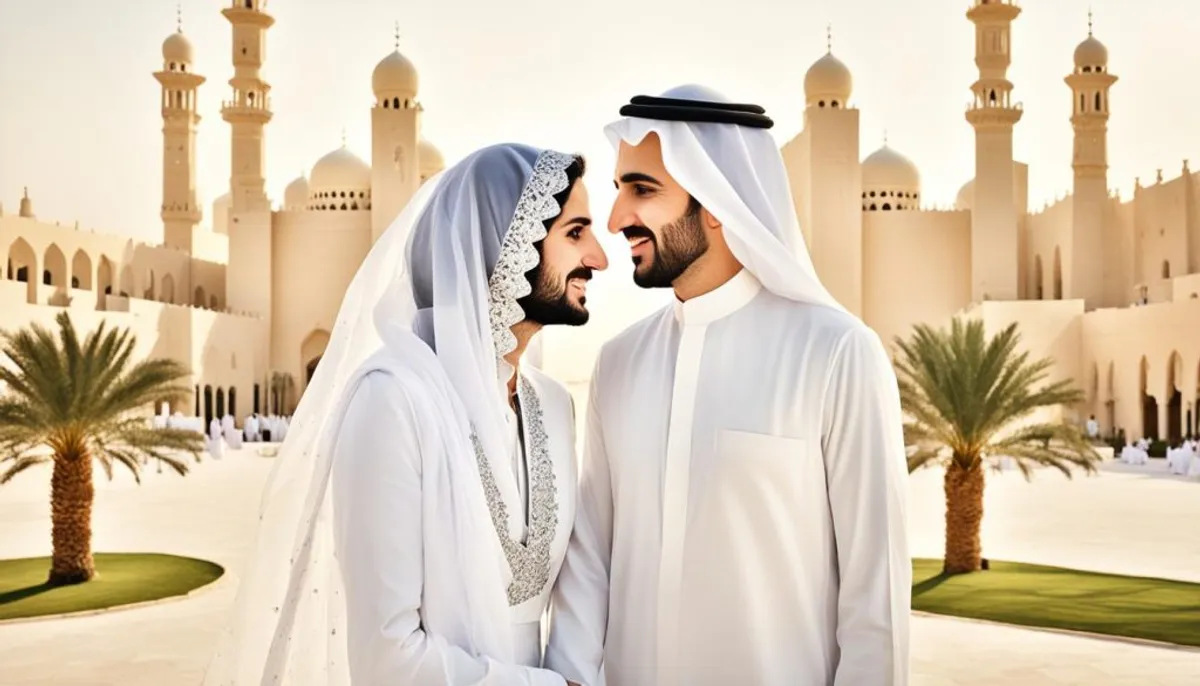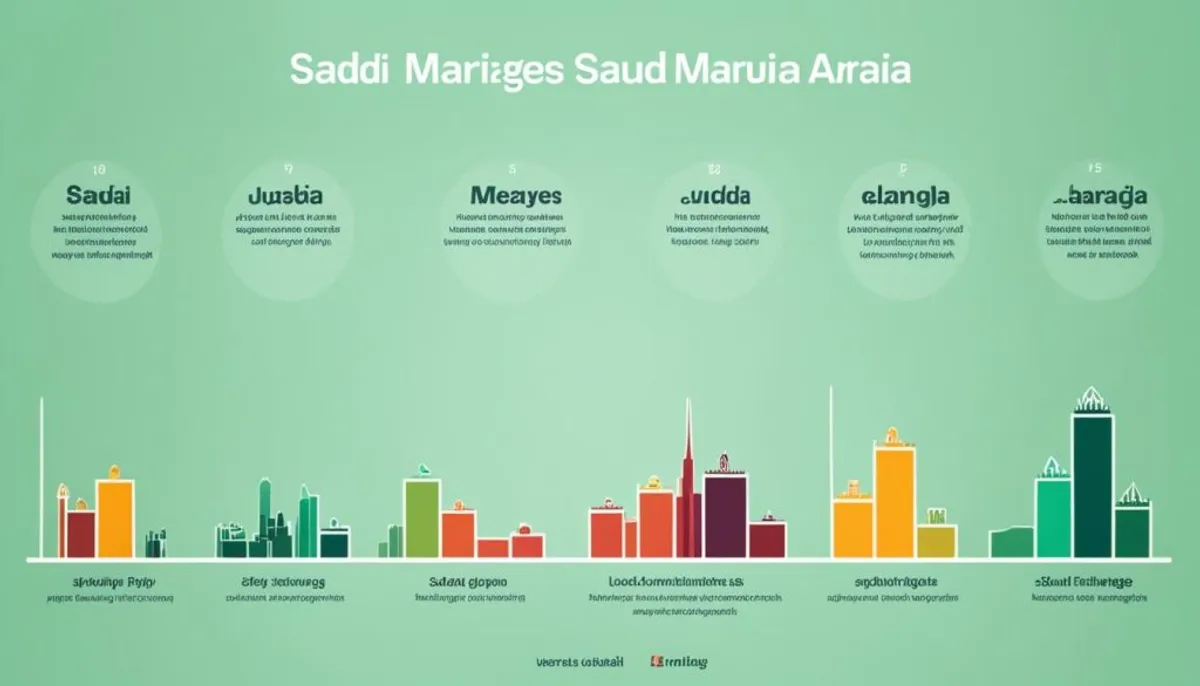In Saudi Arabia, the length of marriages is a topic many find interesting. This article looks into what makes marriages last in the kingdom. It talks about how tribal traditions, changes in society, and personal views on commitment affect marriages.

Looking into marriage in Saudi Arabia, we see how tribal traditions shape courtship and marriage. These traditions help keep families financially and socially stable. They also show how long marriages can last in the kingdom, highlighting the importance of marital longevity in saudi arabia.
But marriage in Saudi Arabia is more than just tribal traditions. “Meta tribes” and “reverse tribalism” have changed how people think about finding a partner. The article explores how these changes affect marriages and their success.
Understanding Tribal Marriage Traditions in Saudi Arabia
In Saudi Arabia, the complex network of tribal ties and customs has deeply influenced marriage customs. These tribal marriage traditions were meant to keep the tribe wealthy and united. They helped ensure the tribe’s success and unity.
Purpose and Origins of Tribal Marriage Rituals
The tribal marriage rituals in Saudi Arabia started to keep wealth within the tribe. They aimed to protect the tribe’s strength and balance power among groups. This helped keep the tribe safe and in control.
- Dowry and bride price talks were key to keeping the tribe’s wealth safe. They stopped wealth from leaving the tribe.
- Rules about who could marry helped keep the tribe strong. They made sure everyone felt connected and in line with the tribe.
- Big tribal marriage rituals and ceremonies showed the tribe’s unity. They made everyone feel part of a shared history and tradition.
Maintaining Financial and Social Stability Within Tribes
Even with changes in laws and social support, tribal marriage traditions still matter in Saudi Arabia. They guide marriage choices, keeping the tribe financially and socially stable. This helps the tribe stay strong in a world that’s always changing.
Sticking to tribal affiliations and compatibility criteria in marriage shows how important these traditions are in Saudi Arabian life, including the need to understand cultural wedding gift etiquette.
The Concept of “Meta Tribes” and Reverse Tribalism
In Saudi Arabia, a new trend called “meta tribes” is changing the social scene. These groups are not traditional tribes but act like them. They look for partners based on social status, financial situation, religious values, and family associations.
Non-Tribal Families and the Formation of Meta Tribes
As traditional tribes lose power, non-tribal families in Saudi Arabia are forming their own groups. These meta tribes help keep their social and financial status. They offer a community feeling for those outside the old tribal system. Choosing a partner now focuses more on these factors, which can significantly influence marital longevity in saudi arabia.
Marriage Compatibility Criteria for Meta Tribes
- Social status: Meta tribes look for partners with similar social levels. This keeps their family’s position strong in the group.
- Financial situation: Being financially stable is crucial for meta tribes. They want to keep their economic level.
- Religious values: Sharing religious beliefs is key in choosing a partner. It helps keep the group united.
- Family associations: A family’s connections in the meta-tribe matter a lot. They affect how good a match a partner is.
Reverse tribalism is now big in Saudi Arabia’s marriage choices. Families aim to keep their social and financial position in their groups. Learning about meta tribes and their marriage criteria sheds light on the changing social life in the area.
Personal Reflections on Marriage and Meta Tribalism
As a Saudi native, I’ve seen how marriage and meta-tribal affiliations mix in complex ways. In my society, family ties and tribal connections are very important. These factors can make relationships stronger or harder.
Looking back at my personal experiences, finding the right partner means thinking about more than just getting along. You also have to think about the big marriage challenges from meta-tribal rules. The need to marry within your network or follow old ways can cause stress. This is because what you want might not match what others expect.
- Finding a balance between what you want and what your family expects is hard and emotional.
- The impact of meta tribalism on relationships is always there. People have to think about the effects of their choices.
- It’s tough to find a middle ground between your own perspectives and what everyone else wants. This is true for many Saudis trying to have happy marriages.
Even with the challenges, I’m hopeful about marriage in Saudi Arabia’s future. The country is changing socially and economically. This could lead to new ways of looking at meta-tribal ties and giving people more freedom in their choices.
My thoughts on this topic come from understanding Saudi culture and society’s changes. The hurdles are big, but I think talking openly, understanding each other, and focusing on well-being can help. This could make marriage and relationships better in the Kingdom.
How Long Does Marriage Last? Saudi Insights
Factors Influencing Marital Longevity in Saudi Arabia
Marriage is a key part of Saudi Arabian culture. Over time, society has changed, but tribal affiliations and meta-tribal affiliations still affect how long marriages last. These factors are key to understanding marital longevity in the Kingdom.
Role of Tribal and Meta-Tribal Affiliations
In Saudi Arabia, tribal identity is a big part of life. Families often look for marriage trends that match their tribal affiliations. This helps keep unity and traditions alive. But, meta-tribal structures have added complexity. Now, people from different backgrounds are forming their own connections and setting their own marriage criteria.
- Tribal Affiliations: For a long time, marrying within the tribe has helped marriages last longer in some parts of Saudi Arabia. These marriages keep social and financial ties strong within the tribe.
- Meta-Tribal Affiliations: Now, Saudi couples are choosing meta-tribal marriages more often. These are between people from different tribes. They mix their cultures and start new marriage trends. This change makes marriages more flexible and adaptable.
Looking at how tribal affiliations, meta-tribal affiliations, and marital longevity connect in Saudi Arabia helps us understand the complex social forces at play. These forces shape the country’s marriage trends.

Societal Changes and Marriage Trends in Saudi Arabia
In recent years, Saudi Arabia has seen big changes that have changed marriage practices a lot. These changes came from new laws that made marriage and family life different in the kingdom.
Recent Reforms and Impact on Marriage Practices
The ban on child marriages is a big change. It was a tradition in some parts of Saudi Arabia. Now, young people, especially girls, are not forced to marry too young.
This change has made people wait longer to get married. They want to be more ready before they start a life together, which raises the question of whether marriage is worth it for women.
| Societal Change | Impact on Marriage Practices |
|---|---|
| Ban on child marriages | Increased age of marriage, greater autonomy for individuals |
| Increased educational and career opportunities for women | Delayed marriage, greater focus on personal development |
| Evolving gender roles and norms | Shift in power dynamics within marriages, more egalitarian partnerships |
Women now have more chances to go to school and work. This has changed marriage trends. People, both men and women, are focusing on their goals before getting married. So, they’re getting married later.
These changes have made a big difference. They’ve changed when and how people get married. They’ve also changed how people see marriage in Saudi Arabia. It will be interesting to see how marriage changes in the future.
Marriage Counseling and Conflict Resolution in Saudi Arabia
In Saudi Arabia, marriage counseling and conflict resolution are key to helping couples. They focus on the special challenges of Saudi marriages, especially those tied to tribal and meta-tribal ties. These services aim to help couples deal with complex family issues and find ways to solve their problems.
Marriage counseling here looks at the whole picture. It considers the needs of each spouse and the social and cultural setting of their relationship. Experts work with couples to understand their relationship’s details. They look at how tribal or meta-tribal ties affect things. Then, they offer advice and strategies for better communication, solving conflicts, and supporting the marriage.
| Service | Approach | Impact |
|---|---|---|
| Marriage Counseling | Holistic, considering social and cultural contexts | Strengthens communication, conflict resolution, and marital support |
| Conflict Resolution | Addresses unique challenges of tribal and meta-tribal dynamics | Helps couples find constructive solutions to their conflicts |
More and more couples in Saudi Arabia are turning to these services. They help couples deal with the changing world of marriage and family. By offering counseling and conflict resolution, Saudi couples can better handle their relationship’s challenges. This leads to stronger, more lasting marriages that help the social fabric of the Kingdom.

Saudi Arabia is putting a lot into helping its married couples. By offering these specialized services, they’re helping couples build strong, lasting relationships. These relationships can overcome the unique challenges they face in their cultural and social setting.
Conclusion
As we wrap up our look at marriage in Saudi Arabia, we see a mix of old traditions, new changes, and new ways to help marriages last. The blend of tribal and meta-tribal influences has deeply shaped marriage in the Kingdom. “Meta tribes” show how family ties can change and stay strong over time.
This journey has shown us how important money and social support are in tribal settings. It also shows how much personal connection and shared values matter in choosing a partner. With changes in Saudi Arabia, couples now have more ways to make their marriages work.
The future of marriage in Saudi Arabia is full of both ups and downs. Making marriage counseling and solving conflicts better will help couples and families. The Saudi people’s ability to adapt and bounce back is promising for the future of marriage. It looks like marriage will keep evolving, balancing old traditions with new changes.
RelatedRelated articles



